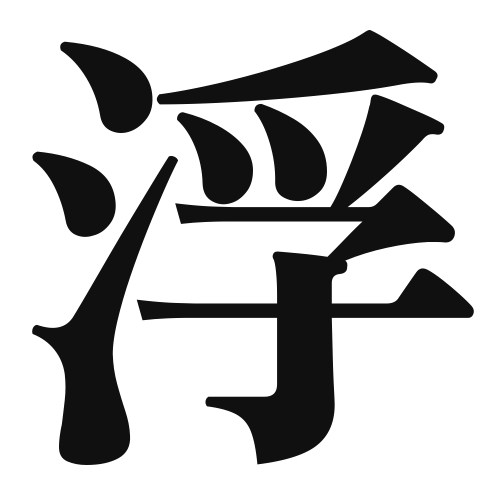1. Overview of Meaning
The kanji “浮” (pronounced “u” or “bu”) generally means “to float” or “to rise.” It conveys the idea of something that is not firmly anchored and can move freely in water or air.
2. Formation and Radical
Formation of the Kanji: The kanji “浮” is a phonetic-ideographic character (形声文字). It combines the radical for water (氵) with the phonetic component “付” (fu), which suggests the sound.
Radical: The radical of “浮” is 氵, which is related to water, indicating its connection to floating or being buoyant.
3. Examples of Usage
Common Words and Phrases: Some frequently used words that include “浮” are:
- 浮かぶ (ukabu) – to float
- 浮き輪 (ukiwa) – floatation ring
- 浮世絵 (ukiyo-e) – a genre of Japanese art depicting landscapes and scenes from everyday life
Example Sentences in Daily Conversation:
- このボートは水に浮かんでいます。 (Kono bōto wa mizu ni ukandeimasu.) – This boat is floating on the water.
- 彼のアイデアはとても浮かんでいます。 (Kare no aidea wa totemo ukandeimasu.) – His idea is very innovative.
4. Synonyms and Antonyms
Similar Kanji: A similar kanji is “沈” (chin), which means “to sink.” While “浮” refers to something that is buoyant and rises, “沈” indicates something that goes down or submerges.
Opposite Kanji: The opposite of “浮” is “沈” (chin), highlighting the contrast between floating and sinking.
5. Cultural and Historical Background
Connection to Japanese Culture: The concept of “浮” is significant in Japanese culture, especially in art forms like ukiyo-e, which literally means “pictures of the floating world.” This reflects a transient beauty and the impermanence of life.
Proverbs and Idioms: One common saying is “浮き沈み” (uki shizumi), which means “ups and downs,” often used to describe the fluctuations in life or fortune.
